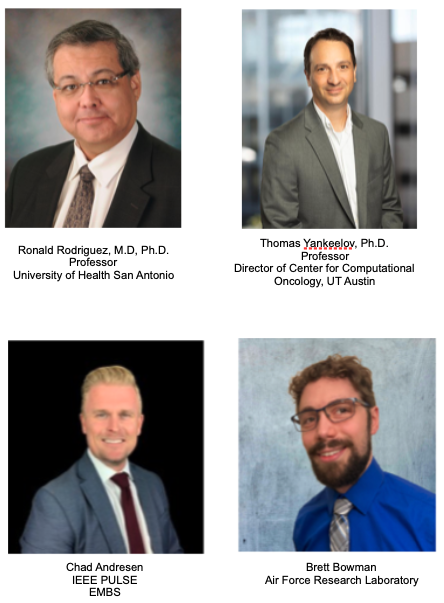2nd Annual IEEE LSS EMB Workshop on AI and Healthcare
IEEE Lone Star Section EMBS Chapter and the Life Members Affinity Group will host the 2nd Annual Workshop on AI and Healthcare. Event will be held in conjunction with the Computer Sciences Department's Research Day and Poster Presentations. The website for the event is as follows:
https://r5.ieee.org/lss-embs/trust-in-ai-workshop-2025/
Like last year, the purpose of the workshop is to assemble engineers and scientists with an interest in Artificial Intelligence (AI) as applied to the field of healthcare. The workshop is expected to also expand interest in EMB activities across several technical chapters, affinity groups and Section members. Additionally, the event will focus on expanding interest in EMB for students and faculty at the many academic institutions within the Lone Star Section. In addition the event will include Texas State University in San Marcos (Central Texas Section), with emphasis on its very active IEEE faculty and student branch.
The workshop will featuring a Keynote, Panel Discussion, and Poster session at the Texas State University STAR Park Conference facility in San Marcos, Texas on December 5, 2025. (Room 173, 174 and 105)
Students: Please submit a title and abstracts (less than 500 words) to https://forms.gle/
The best 5 posters abstracts will be published in IEEE Pulse Magazine.
Date and Time
Location
Hosts
Registration
-
 Add Event to Calendar
Add Event to Calendar
- Starts 29 August 2025 01:00 PM UTC
- Ends 03 December 2025 05:00 PM UTC
- 0 in-person spaces left!
- Admission fee ?
Speakers
Dr. Brian Telfer
Keynote: Activity Monitoring as a Window into Health and Performance
During the past 15 years, consumer wearable monitors have progressed rapidly from counting steps to a host of proprietary activity and sleep metrics. The next generation of monitoring capability will provide much more health-related, actionable information. In this talk, Brian will give an overview of these upcoming technologies and the underlying biosignal processing techniques for analyzing activity and sleep, including several examples from MIT Lincoln Laboratory: 1) early detection of Parkinson’s Disease and other movement disorders, 2) risk stratification based on levels of visceral adipose tissue, an important health biomarker, 3) presymptomatic detection of infectious disease, 4) quantitative estimation of fatigue to optimize scheduling of shift workers, 5) early detection of exertional heat stroke. The first two applications are based on analyzing publicly available accelerometry datasets: the U.S. National Health and Nutrition Examination Survey (NHANES) with about 8,000 subjects and the U.K. Biobank with 100,000 subjects. Biosignal processing algorithms that have been considered range from straightforward baselines of steps and cadence and sleep fragmentation, to correlation structure algorithms adopted from the radar signal processing community, to deep learning. All of these case studies involve close collaborations between engineers and senior physiologists, clinicians and end users; Brian will share experience on what is required for a high-performing engineering and medical team. Brian will also offer perspectives on wearable sensing technology transfer, progressing from idea to impact, and innovating in the national and global interest, based on his career working for a U.S. National Laboratory.
Biography:
MIT Lincoln Laboratory, Lexington MA 1995-present, Senior Staff Member, Human Health and Performance Systems (Highest level of technical track, 10% of all PhD staff, equivalent to Full Professor)
Dr. Brian Telfer is a Senior Staff Member in the Human Health and Performance Systems Group at MIT Lincoln Laboratory, a National Laboratory for the U.S. Government that serves as a bridge between academia and industry. In this role, he provides technical leadership in applications relating to human performance and prehospital medical care. His expertise spans biosignal and image processing, medical ultrasound, radar signal processing, machine learning and artificial intelligence, system analysis, rapid prototyping and technology transition. He has a special passion for transitioning bioengineering technology that has been restricted to hospitals and research laboratories into field and home environments, fitting with the “hospital-at-home” theme.
Address:Lexington, MA, United States
Panelists
Agenda
8:30 AM: Registration and breakfast
9:00-9:15 AM: Introduction and Welcome by TXST
9:15-10:15 AM: Keynote Lecture: Brian Telfer, PhD, Senior Staff Member, Human Health and Performance Systems Group at MIT Lincoln Laboratory
10:15-11:15 AM: Panel Discussion – Trust in AI
-
Tom Yankeelov, PhD, Director, Center for Computational Oncology, University of Texas at Austin
- Mr. Brett Bowman, Research Physicist, Bioeffects Division, Air Force Research Laboratory
- Mr. Chad Andresen, Editor-in-Chief, IEEE Pulse Magazine
- Ronald Rodriguez, MD, PhD, Henry B. & Edna S. Dielmann Memorial Professor of Urologic Science, University of Texas Health Science Center
11:15-11:45 AM: IEEE Lone Star Section Presentation – Dr. Walt Downing, Section Chairman
11:45-12:45 PM: Lunch (BBQ)
12:45-2:15 PM: Poster presentations
2:15 PM: Wrap up and closing remarks
2:30 PM: Workshop Adjourn



